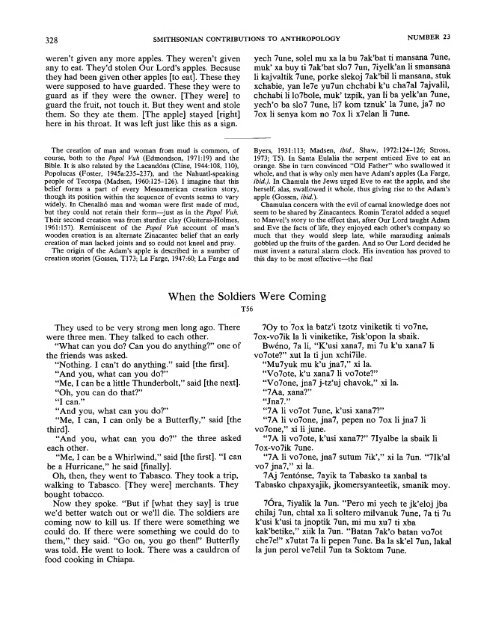PDF (Lo-Res) - Smithsonian Institution Libraries
PDF (Lo-Res) - Smithsonian Institution Libraries
PDF (Lo-Res) - Smithsonian Institution Libraries
Create successful ePaper yourself
Turn your PDF publications into a flip-book with our unique Google optimized e-Paper software.
328 SMITHSONIAN CONTRIBUTIONS TO ANTHROPOLOGY NUMBER 23<br />
weren't given any more apples. They weren't given<br />
any to eat. They'd stolen Our <strong>Lo</strong>rd's apples. Because<br />
they had been given other apples [to eat]. These they<br />
were supposed to have guarded. These they were to<br />
guard as if they were the owner. [They were] to<br />
guard the fruit, not touch it. But they went and stole<br />
them. So they ate them. [The apple] stayed [right]<br />
here in his throat. It was left just like this as a sign.<br />
The creation of man and woman from mud is common, of<br />
course, both to the Popol Vuh (Edmondson, 1971:19) and the<br />
Bible. It is also related by the Lacandons (Cline, 1944:108, 110),<br />
Popolucas (Foster, 1945a:235-237), and the Nahuatl-speaking<br />
people of Tecospa (Madsen, 1960:125-126). I imagine that this<br />
belief forms a part of every Mesoamerican creation story,<br />
though its position within the sequence of events seems to vary<br />
widely. In Chenalho man and woman were first made of mud,<br />
but they could not retain their form—just as in the Popol Vuh.<br />
Their second creation was from sturdier clay (Guiteras-Holmes,<br />
1961:157). Reminiscent of the Popol Vuh account of man's<br />
wooden creation is an alternate Zinacantec belief that an early<br />
creation of man lacked joints and so could not kneel and pray.<br />
The origin of the Adam's apple is described in a number of<br />
creation stories (Gossen, T173; La Farge, 1947:60; La Farge and<br />
They used to be very strong men long ago. There<br />
were three men. They talked to each other.<br />
"What can you do? Can you do anything?" one of<br />
the friends was asked.<br />
"Nothing. I can't do anything." said [the first].<br />
"And you, what can you do?"<br />
"Me, I can be a little Thunderbolt," said [the next].<br />
"Oh, you can do that?"<br />
"I can."<br />
"And you, what can you do?"<br />
"Me, I can, I can only be a Butterfly," said [the<br />
third].<br />
"And you, what can you do?" the three asked<br />
each other.<br />
"Me, I can be a Whirlwind," said [the first]. "I can<br />
be a Hurricane," he said [finally].<br />
Oh, then, they went to Tabasco. They took a trip,<br />
walking to Tabasco. [They were] merchants. They<br />
bought tobacco.<br />
Now they spoke. "But if [what they say] is true<br />
we'd better watch out or we'll die. The soldiers are<br />
coming now to kill us. If there were something we<br />
could do. If there were something we could do to<br />
them," they said. "Go on, you go then!" Butterfly<br />
was told. He went to look. There was a cauldron of<br />
food cooking in Chiapa.<br />
When the Soldiers Were Coming<br />
T56<br />
yech 7une, solel mu xa la bu 7ak'bat ti mansana 7une,<br />
muk' xa buy ti 7ak'bat slo7 7un, 7iyelk'an li smansana<br />
li kajvaltik 7une, porke slekoj 7ak'bil li mansana, stuk<br />
xchabie, yan Ie7e yu7un chchabi k'u cha7al 7ajvalil,<br />
chchabi li Io7bole, muk' tzpik, yan li ba yelk'an 7une,<br />
yech'o ba slo7 7une, H7 kom tznuk' la 7une, ja7 no<br />
7ox li senya kom no 7ox li x7elan li 7une.<br />
Byers, 1931:113; Madsen, ibid., Shaw, 1972:124-126; Stross,<br />
1973; T5). In Santa Eulalia the serpent enticed Eve to eat an<br />
orange. She in turn convinced "Old Father" who swallowed it<br />
whole, and that is why only men have Adam's apples (La Farge,<br />
ibid.). In Chamula the Jews urged Eve to eat the apple, and she<br />
herself, alas, swallowed it whole, thus giving rise to the Adam's<br />
apple (Gossen, ibid.).<br />
Chamulan concern with the evil of carnal knowledge does not<br />
seem to be shared by Zinacantecs. Romin Teratol added a sequel<br />
to Manvel's story to the effect that, after Our <strong>Lo</strong>rd taught Adam<br />
and Eve the facts of life, they enjoyed each other's company so<br />
much that they would sleep late, while marauding animals<br />
gobbled up the fruits of the garden. And so Our <strong>Lo</strong>rd decided he<br />
must invent a natural alarm clock. His invention has proved to<br />
this day to be most effective—the flea!<br />
7Oy to 7ox la batz'i tzotz viniketik ti vo7ne,<br />
7ox-vo7ik la li viniketike, 7isk'opon la sbaik.<br />
Bweno, 7a li, "K'usi xana7, mi 7u k'u xana7 li<br />
vo7ote?" xut la ti jun xchi7ile.<br />
"Mu7yuk mu k'u jna7," xi la.<br />
"Vo7ote, k'u xana7 li vo7ote?"<br />
"Vo7one, jna7 j-tz'uj chavok," xi la.<br />
"7Aa, xana?"<br />
"Jna7."<br />
"7A li vo7ot 7une, k'usi xana7?"<br />
"7A li vo7one, jna7, pepen no 7ox li jna7 li<br />
vo7one," xi li June.<br />
"7A li vo7ote, k'usi xana7?" 7Iyalbe la sbaik li<br />
7ox-vo7ik 7une.<br />
"7A li vo7one, jna7 sutum 7ik\" xi la 7un. "7Ik'al<br />
vo7 jna7," xi la.<br />
7Aj 7entonse, 7ayik ta Tabasko ta xanbal ta<br />
Tabasko chpaxyajik, jkomersyanteetik, smanik moy.<br />
7Ora, 7iyalik la 7un. "Pero mi yech te jk'eloj jba<br />
chilaj 7un, chtal xa li soltero milvanuk 7une, 7a ti 7u<br />
k'usi k'usi ta jnoptik 7un, mi mu xu7 ti xba<br />
kak'betike," xiik la 7un. "Batan 7ak'o batan vo7ot<br />
che7e!" x7utat 7a li pepen 7une. Ba la sk'el 7un, lakal<br />
la jun perol ve7elil 7un ta Soktom 7une.

















